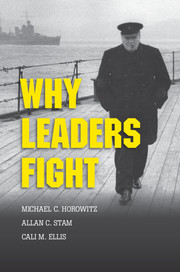Description
Why Leaders Fight
Authors: Horowitz Michael C., Stam Allan C., Ellis Cali M.
Using in-depth research on famous leaders, this book explores how their life experiences fundamentally shape the reasons why nations go to war.
Language: English
Subject for Why Leaders Fight:
Approximative price 31.44 €
In Print (Delivery period: 14 days).
Add to cart
Why Leaders Fight
Publication date: 09-2015
228 p. · 15.3x22.9 cm · Paperback
Publication date: 09-2015
228 p. · 15.3x22.9 cm · Paperback
Approximative price 67.44 €
In Print (Delivery period: 14 days).
Add to cart
Why Leaders Fight
Publication date: 09-2015
228 p. · 15.3x23.7 cm · Hardback
Publication date: 09-2015
228 p. · 15.3x23.7 cm · Hardback
Description
/li>Contents
/li>Biography
/li>
The history of political events is made by people. From wars to elections to political protests, the choices we make, our actions, how we behave, dictate events. Not all individuals have the same impact on our world and our lives. Some peoples' choices alter the pathways that history takes. In particular, national chief executives play a large role in forging the destinies of the countries they lead. Why Leaders Fight is about those world leaders and how their beliefs, world views, and tolerance for risk and military conflict are shaped by their life experiences before they enter office - military, family, occupation, and more. Using in-depth research on important leaders and the largest set of data on leader backgrounds ever gathered, the authors of Why Leaders Fight show that - within the constraints of domestic political institutions and the international system - who ends up in office plays a critical role in determining when and why countries go to war.
1. How leaders matter; 2. Systematically evaluating leader risk; 3. Leader risk across geography and time; 4. The experiences that matter I: military, rebel, age, and education; 5. The experiences that matter II: childhood, family, and gender; 6. 'L'état c'est moi', … or is it?
Michael C. Horowitz is an Associate Professor of Political Science at the University of Pennsylvania and the author of the award-winning book, The Diffusion of Military Power. He has published widely in academic journals and mainstream media outlets on topics including the role of leaders in international politics, military innovation and the future of war, and forecasting. Professor Horowitz has worked at the Department of Defense, is a Term Member of the Council on Foreign Relations, and is a member of the International Institute for Strategic Studies. He received a PhD in Government from Harvard University and a BA in Political Science from Emory University, Atlanta.
Allan C. Stam is Dean of Leadership and Public Policy at the Frank Batten School at the University of Virginia. His work on war outcomes, durations, and mediation has appeared in numerous political science journals. Several grants have supported his work, including four from the National Science Foundation. His books include Win, Lose, or Draw (1996), Democracies at War (2002), and The Behavioral Origins of War (2004). He is the recipient of the 2004 Karl Deutsch award, given annually by the International Studies Association to the scholar under the age of forty who has made the greatest contribution to the study of international politics.
Cali M. Ellis previously worked at the RAND Corporation, the Homeland Security Directorate of the Michigan National Guard, and the Michigan Governor's Office. She is a member of the Edward A. Bouchet Graduate Honor Society, and her awards include the National Science Foundation IDEAS-IGERT Graduate Fellowship, the APSA Janet Box-Steffensmeier Award, the ProQuest Dissertation Writing Award, and a Distinguished Service Medal from the Michigan National Guard. Ellis has a BA in economics from Bates College, Maine and an MPP from the University of Michigan Gerald R. Ford School of Public Policy, and has published in International Interactions (2015), the Journal
Allan C. Stam is Dean of Leadership and Public Policy at the Frank Batten School at the University of Virginia. His work on war outcomes, durations, and mediation has appeared in numerous political science journals. Several grants have supported his work, including four from the National Science Foundation. His books include Win, Lose, or Draw (1996), Democracies at War (2002), and The Behavioral Origins of War (2004). He is the recipient of the 2004 Karl Deutsch award, given annually by the International Studies Association to the scholar under the age of forty who has made the greatest contribution to the study of international politics.
Cali M. Ellis previously worked at the RAND Corporation, the Homeland Security Directorate of the Michigan National Guard, and the Michigan Governor's Office. She is a member of the Edward A. Bouchet Graduate Honor Society, and her awards include the National Science Foundation IDEAS-IGERT Graduate Fellowship, the APSA Janet Box-Steffensmeier Award, the ProQuest Dissertation Writing Award, and a Distinguished Service Medal from the Michigan National Guard. Ellis has a BA in economics from Bates College, Maine and an MPP from the University of Michigan Gerald R. Ford School of Public Policy, and has published in International Interactions (2015), the Journal
© 2024 LAVOISIER S.A.S.

